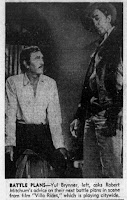The Los Angeles Times
By Kevin Thomas
July 31, 1968
Perhaps Sam
Peckinpah had had the chance to direct the script he wrote for “Villa Rides”
(in multiples) it might have been worthy of the legendary Pancho Villa, the
bandit revolutionary who has been declared officially a national hero by the
Mexican government.
But his screenplay, based on the William Douglas Lansford’s novelized biography, was turned over to writer Robert Towne and director Buzz Kulik. The result is that the deadliest kind of picture, the one that’s neither good nor bad but merely routine “Villa Rides” all right – right out of your mind. It’s hard to remember it the next day.
Bloody Battle
The time is
Mexico 1912. Villa (Yul Brynner) comes out of retirement to defend the
government of President Francisco Madera against the counter revolutionary
group, the Colorados. Although Villa emerges victorious in one bloody battle
after another he is eventually betrayed by the political ambitions of his
superior, Gen. Huerta (Herbert Lom).
However,
American gunrunner Robert Mitchum, who at first supplied machine guns to the
Colorados, saves the day not only with weapons but with his rickety aircraft.
All this
unfolds at a leisurely pace and with lots of violence, much of it supplied by
fierce Villa aide Charles Bronson. Unfortunately, the picture is not strong
enough to sustain all the blood it sheds, so the effect is frankly nauseating.
The most
notable thing about “Villa Rides” is the contrast between the ways in which its
two stars approach their work. Mitchum, easily the more talented of the two,
seems to walk his way through a role that wasn’t much to begin with (It’s one
of those “composites” of various actual men as such has the unintentionally
offensive effect of making it seem that Villa couldn’t have gotten by without
the help of this resourceful Americano).
Gives His All
Brynner, on
the other hand, hasn’t as much to give, but he gives it his all. His Pancho
Villa cannot stand comparison with Brando’s subtle Zapata any more than this
movie can be compared to “Viva Zapata,” but it does have plenty of passion and
vitality.
Along with the
fact that this movie was made in Spain instead of Mexico, the other irony is
that Villa’s friend Madero is played (and very well, too) by Alexander Knox,
who is best remembered for his portrayal of Woodrow Wilson, a prime Villa foe.














No comments:
Post a Comment